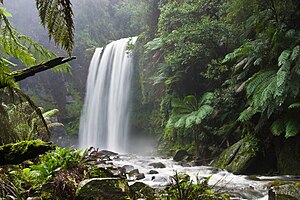While teaching our children about practical methods such as recycling is important, promoting a humble state of mind can have a deeper and more lasting effect. If you plant the seed of environmental humility in your children, perhaps those children will recognize the quiet importance of nature and grow up to develop innovative ways to preserve the planet.
| (Photo credit: Wikipedia) |
1. Treat your children with respect
Most parents know that children will do what their parents do more than what their parents say. Children are going to treat others the way they are treated. If children are treated respectfully, they will develop a respectful and compassionate attitude which is one of the building blocks of environmental awareness. They are then more likely to treat the planet and other things in their lives with respect, and not exploit the earth's resources.
2. Strive for a "natural" lifestyle
Children who are not connected to nature will have a hard time loving and appreciating it. Breastfeeding, babywearing, natural childbirth, and other natural parenting approaches are a child's first connection to nature.
Consider natural foods as well. Children love to forage for edible plants and fruits. A trip to the library will reveal many excellent books on the recognition and harvesting of wild foods. Children will see nature as a provider if they participate in this way. Just be sure you know what you are picking!
Alternatively, you could grow your own food or visit a neighbor's farm or garden in order to show them where food comes from. Once again, your kids will see that the earth is a provider of sustenance. Point out to your children that without good soil, air, and water, there would be no food.
| (Photo credit: Wikipedia) |
Experiencing nature through a screen is more likely to elicit a love of technology than a love of nature (not that a love of technology is necessarily bad; but it's a good idea to balance it with an appreciation of the natural world). Take your kids outside on a starry night and show them the enormity of the night sky. Show them large, sweeping spaces, high mountains, deep woods and ancient, massive trees. They will begin to see their respective smallness, and the seeds of humility are sown.
Go hiking or camping, and encourage your children to write, draw and discuss the experience and how it made them feel. This will encourage self-reflection and a personal identification with nature.
The future of the planet begins with teaching our children to love it. And in doing so, we'll come to love and appreciate it more ourselves as well.



No comments:
Post a Comment